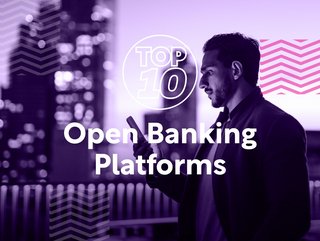Top 10 open banking platform providers in fintech 2023

Open banking has the power to transform financial services online, allowing users to share their transactional history with third parties and paving the way for a tidal wave of innovative new use-cases and apps. In particular, it is helping to reshape the way that lenders decision risk, giving consumers new tools to budget and manage their finances, and supporting a surge in account-to-account (A2A) payments.
So who are the Top 10 open banking platform providers facilitating this tech revolution? We've picked out some of our favourites.
10. Finflux
Based in India, Finflux’s suite of cloud-first lending services give financial institutions the tools they need to create a modern lending experience for customers. And it’s paying off; Finflux has partnered with 100 institutions to build up a loan portfolio worth around US$9bn, lending to more than 20m borrowers spread throughout 15+ countries. The fintech enabler hopes its success and scale will bolster financial inclusion and improve access to good-quality financial services – particularly when it comes to credit – one of the most commonly cited aims of open banking adopters.
9. Yodlee
Yodlee’s platform offers data aggregation and data analytics, which it says are the foundation to open banking innovation. Its products and services are used by at least 1,500 financial institutions and fintechs, including 15 of the top 20 US banks. This vast reach allows it to reach a total of 30m customers. Yodlee’s insights allow financial services firms to gain a deeper insight into their clients – opening up new business opportunities, allowing them to better understand risk, and making it easier to supply personalised advice and guidance. Yodlee was acquired by Envestnet in 2015.
8. DirectID
DirectID provides open banking data to help lenders make smarter credit and risk decisions. The nature of the open banking movement means that financial services providers can gain access to a consumer’s transactional history, assuming they have achieved the requisite permissions, giving a more crystalline picture of a person’s financial situation compared to traditional credit scoring models. The greater insights that this enables for lenders allows them to scale their business, drive efficiencies, reduce risk and create fairer outcomes for borrowers, DirectID claims.
7. Bud Financial
Bud Financial has developed a data intelligence platform that it says helps financial institutions and customers to better understand their financial situation together. Founded in 2015, Bud began life as an education platform but is now on a mission to make financial decisions simpler, namely by serving up transactional data that can be turned into richer customer insights. It has over 100 employees across four countries helping the London-based firm to securely process an impressive 300m transactions every month.
6. Salt Edge
Salt Edge is the company behind an open banking API solution that allows clients to offer much smarter digital services to their customers. In a recent report, the Canada-headquartered business listed five of the most prominent use-cases for B2B open banking: SME lending and credit decisioning; digital accounting; treasury management; business finance management and automation; plus business banking. Salt Edge is led by Garri Galanter, a business veteran with a background in banking, who, prior to being appointed to the top job in 2022, had advised the company since 2013.
5. TrueLayer
Describing itself as “Europe's leading open banking payments network”, London-based TrueLayerhelps to connect banks, people and brands together to create more meaningful financial experiences. Its technology solutions allow money apps and fintechs to move money more quickly; ecommerce merchants to drive sales and boost loyalty; and crypto innovators to devise smoother on-ramps and off-ramps between fiat and defi. Clients include Freetrade, Nutmeg, OakNorth, Revolut and Coinbase.
4. Token
Token is building an account-to-account (A2A) payments infrastructure powered by open banking. A2A transactions involve a consumer logging into their online bank account at the point of sale and paying directly through their bank, integrated through Token’s API, rather than the traditional methods that often relied on something – like a credit card – playing the role of the middleman. Token has already built up 80% connectivity among banks in 16 European markets, claiming its method of paying is instantaneous and affordable.
3. Stripe
Stripe Connect leverages the technology and expertise of the multi-billion-dollar Silicon Valley fintech to deliver a fast and easy way for businesses to integrate payments into their platform or marketplace. Stripe’s APIs allow its clients and partners to build and scale end-to-end payments experiences, all the while creating new revenue streams to help businesses diversify. It has already partnered with the likes of Salesforce, Shopify, WooCommerce and OpenTable, among others, and is already available in 14 different languages throughout more than 35 markets and regions.
2. Tink
With around 6,000 integrations, Tink is helping over 300 banks and fintechs – including big-name brands such as Paypal, Stripe, American Express and ABN Amro – to engage with the open banking experience. This, in turn, helps to attract new customers and increase the efficiency of existing operations, the fintech says. It is deeply scalable, with reliable connections that handle over 1bn API calls a month, and reliable too, boasting 99.9%+ uptime. Founded in 2012, the company is headquartered in Stockholm, Sweden.
1. Plaid
Plaid is a data network and payments platform that helps companies to realise all the benefits of open banking through a single integration. With a mission to make it easier for customers to connect their financial accounts to third-party fintech services, Plaid is already supporting over 12,000 financial institutions to unlock the power of open banking, facilitating more than 8,000 digital financial services to be built on the Plaid platform. The company has six offices around the world, as well as almost 1,000 members of staff.
******
For more insights from FinTech Magazine, you can see our latest edition of FinTech Magazine here, or you can follow us on LinkedIn and Twitter.
You may also be interested in our sister site, InsurTech Digital, which you can also follow on LinkedIn and Twitter.
Please also take a look at our upcoming virtual event, FinTech LIVE London, coming on 8-9 November 2023.
******
BizClik is a global provider of B2B digital media platforms that provides executive communities for CEOs, CFOs, CMOs, Sustainability Leaders, Procurement & Supply Chain Leaders, Technology & AI Leaders, Cyber Leaders, FinTech & InsurTech Leaders as well as covering industries such as Manufacturing, Mining, Energy, EV, Construction, Healthcare, and Food & Drink.
BizClik – based in London, Dubai, and New York – offers services such as Content Creation, Advertising & Sponsorship Solutions, Webinars & Events.
- Hong Kong’s FundPark Lands US$250m in Goldman Sachs BackingVenture Capital
- Sumsub: Identity Fraud up 73%; how can Fintechs React?Fraud & ID Verification
- Money20/20 USA: Convera Talks FX Volatility for BusinessesFinancial Services (FinServ)
- Mastercard: Supporting B2B Healthcare With Payments SolutionFinancial Services (FinServ)







